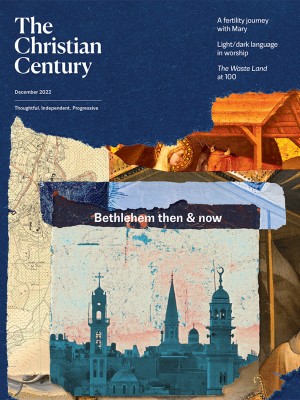What sort of Christian story is viable in our time?
I’m hoping for one that’s lyrical, chastened, hallowed.

The world is charged with story. It’s changed by it, too. This is part of Christianity’s testimony. Even if its various iterations reflect a complex history of power, vulnerability, and compromise, as well as imperial exploitation and more than a measure of grace and love, at the still center of Christianity is a story: the story of God emptied in the form of a babe into human flesh. This is the God who comes into the world as the child of peasants in a no-note province of a then-unassailable empire; a child who grows up as a member of God’s covenant people and—as a teacher, exorcist, and healer—invites his listeners into the fullness of God’s love; a man who is called Messiah and Son of God by some and troublemaker by others; one who, ultimately, is rejected, crucified, and raised from the dead.
It’s a powerful story. However, Christianity has no monopoly on powerful stories. In the 21st century, narrative is ubiquitous. Whole industries rely on story. Novelists, filmmakers, TV showrunners, YouTubers, and TikTokers seek to tell gripping stories; corporations use story to sell consumers both the products they make and the brand itself. Political parties and movements exploit narrative as well to inspire, shape, and (mis)direct. The troubling algorithms of social media have enabled unscrupulous populist groups to boost their stories for money, political advantage, or both.
Read our latest issue or browse back issues.
What hope is there for Christians to speak clearly in a world where the grand religious narrative—mythic, soul-framing, and truth-shaping—is treated as simply a story among other stories? Where even people of faith barely agree on some of the fundamental implications of the narrative that shapes their lives? All Christians use words like justice, hope, and Jesus; yet how they use them seems to depend on social, economic, political, and ethnic bias.
Perhaps I am too anxious about the Christian story’s lack of grip. Isn’t it still the story that shapes most of the other stories in nations like the US and UK? If one dusts over the traces of post-Christian culture in such places, Christian-inflected narratives are readily found. God lurks. Versions of the Christian myth are woven so deep into the textures of White, middle-class US and European storytelling that the myth is barely seen. The sacrifice plot—in which one person lays down their life for the sake of the many—has played out on our big screens and in our imaginations through the stories of Lewis, Tolkien, Rowling, and even the Marvel Cinematic Universe. If the centrality of God in the life of many people and nations is not coming back, Christianity finds its afterlives in those places in the stories it inspires.
But in the face of the toxic uses of story, especially by those who wish to argue for racist or exploitative or cruel visions of Christianity, living into reality matters. Story can’t be redacted out of a life well lived. Joan Didion famously said, “We tell ourselves stories in order to live.” Her words, written out of the wreckage of the 1960s California dream, have only acquired power over time. They capture a truth about humans: we are story makers, story shapers, and creatures who are shaped and made in turn. Didion adds,
We look for the sermon in the suicide, for the social or moral lesson in the murder of five. We interpret what we see, select the most workable of the multiple choices. We live entirely, especially if we are writers, by the imposition of a narrative line upon disparate images, by the “ideas” with which we have learned to freeze the shifting phantasmagoria which is our actual experience.
What sort of Christian story is viable in such times as these? Ultimately, this is something we all need to figure out in fear and trembling. But surely only a chastened version will do: one alert to the riskiness of story and framed through the bodies of those who have often been ruined by the overconfident and insecure deployment of narrative. This would be a rediscovered story from below, centered on and told through the stories of people without power and privilege.
I’d welcome something else, too. Something lyrical: a story that has the character of a song one would want to sing, both alone and with others. A song that sings of the abundance of love. This is a song that holds all the stories we shall ever own up to and those that we, through shame or failure, cannot; it is a song that sings all the griefs we shall ever know; it is a song that does not need to be sung for it is always being sung in the silence of the universe, in the stirrings of birds, in the breeze and storm that tickle and shake trees; it is a song of industry and of rest. It is the sustaining song of the world. It is the world.
It is the world God made and which she beheld as good. It is the universe hallowed and shot through with glory and grace and wounds. It is Christ who holds the world’s griefs in his wounds and continues to cry out for a world of wounds at the Father’s throne. It is the little story and the great one. It is a line of poetry and an epic. It is a word barely mumbled and the grandest novel. It is silence and the most riven cry. It is the word that dwells and drifts and anchors. It is the song that sings us in all our moments—our births, deaths, dreams, triumphs, and failures; in our competence and our ineptitude. It is the bread and cup that sustain us and expose our limitations. It is the precarious body that cannot be destroyed.






